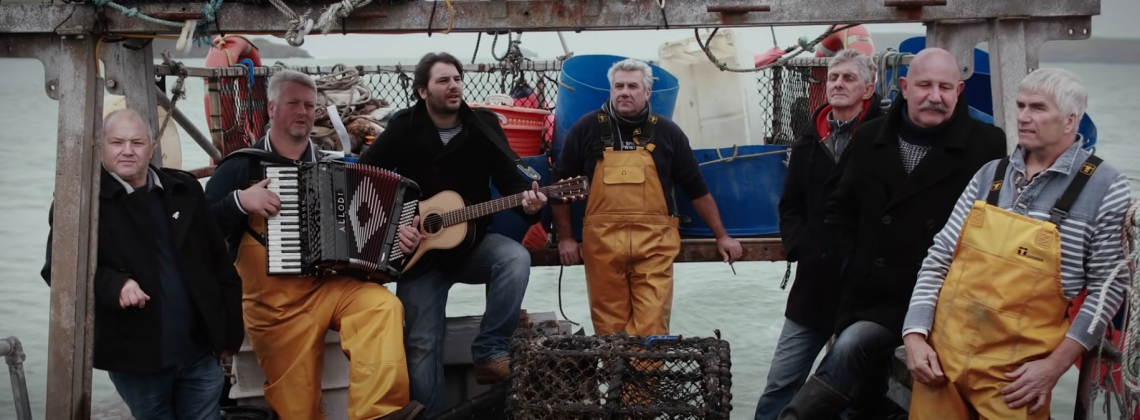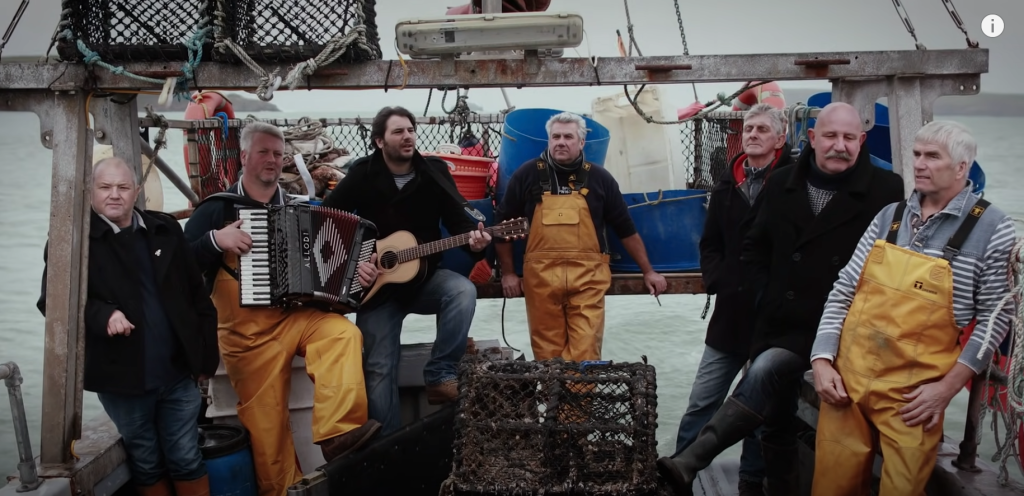

After viewing Fishermans’ Friends, the revival of sea shanties makes even more sense
Early this year a cavalcade of sea shanties, a kind of nineteenth-century folksong, seemed to appear out of the blue. In the 1800s, sailors sang the shanty (likely from the French chanter, to sing) aboard ship both to keep up morale and stay in sync for collective chores like pulling anchor or hoisting the sails. A current music video sensation and a recent movie help us plumb the depths of this return.
On December 27, 2020, a twenty-six-year-old postman living with his wife at his aunt’s home in the small town of Airdrie, Scotland (between Glasgow and Edinburgh) uploaded a video to the social media app TikTok. The black-and-white clip showed Nathan Evans singing a traditional navy song called Wellerman to the sole accompaniment of his own fist pounding on the back of his guitar. Pared-down rhythm and vocals, his take was raw and riveting and the audience response to it visceral and swift. Viewer after viewer posted new renditions. Some created a duet with his video. Others—including even Andrew Lloyd Webber, much to the delight of Evans—added instrumental accompaniment, from strings to flute to keyboard. Within a month Evans’ video had garnered eight million views and Universal Music Group’s Polydor Records had offered him a three-record deal. Evans emphasizes in Rolling Stone (Jan. 26, 2021) that he is not just a postman but an aspiring musician: He promises more. He attributes Wellerman’s appeal to the sense of “unity and friendship” the shanty provided in quarantine.
Surely quarantine set the stage. Wellerman’s lyrics tell of an epic battle with a whale and of the longing for supply ships to come bringing sugar and rum. This clearly resonated in pandemic and lockdown: waiting for food supplies, waiting for treatments and vaccines, waiting for an end to loss and isolation; just waiting. Yet Evans had heard it on Spotify sung by an Australian group called the Albany Shantymen, who have performed it for years.
A movie from 2019 reveals a tide already swelling. Fisherman’s Friends, directed by Chris Foggin, charts another overnight nautical music sensation based on a true story from a decade ago. The movie is currently available for streaming on both Netflix and Amazon Prime Video (hint hint).
“Whatever your ship and wherever your sea, keep haulin’, keep haulin’,” begins the sea-faring song that opens Fisherman’s Friends. A panoramic shot takes in ocean, hills, a darkened sky just emerging from night, rose-bud sun on the horizon poised to blossom, and a cluster of houses with an occasional light on in a window. It’s Port Isaac, a fishing village in Cornwall, England familiar to viewers of the BBC series Doc Martin. “Whatever your storm or your rocks may be, keep haulin’ boys.”
In such a setting, it’s common enough to hear songs like Keep Haulin’ rendered regularly by a group of burly men in an English pub on a village beach come Friday night. It’s less common to hear that the band was discovered by a record producer on holiday and signed to a million pound record deal.
Fisherman’s Friends is based on the true story of ten friends, mostly fishermen and mostly middle aged and older, who regularly gathered to sing for fun and ended up catching the eye—or more aptly, the ear—of the public. The film explores a scenario that presents itself in some form to everyone, even if not in the form of a record deal.
“Hold your course and don’t let go, keep haulin’ boys,” the song ends as the camera wends its way to the kitchen of one of the fishermen (played by James Purefoy). Jim pours coffee while talking to his granddaughter. Beneath his yellow waterproof overalls, his thick turtleneck sweater is the scratchy-soft texture of real wool. Thus begins the viewer’s total immersion in the town, the people, and their lives. On board a lobster boat, Jim and friends sing while working.
Blaring horns and sirens spoil the reverie as the scene shifts to a busy cityscape. Jim’s small, overcrowded kitchen gives way to the arrogance of chic minimalism and soaring ceilings. A cellphone’s ringtone awakens Danny (Daniel Mayes) as his friends rouse him for a stag party sailing trip. On the drive, the music-industry coworkers engage in mocking banter and Danny ribs the groom-to-be for falling into the monogamy trap. Arriving at Port Isaac, they drive the wrong way down a one-way one-lane-only street, and out of the car coming the other way steps Alwyn (Tuppence Middleton), who, as the story progresses, causes Danny to change his tune.
Nothing capture’s man’s plight quite like the sea. It beckons like the past, lures like the future, and both drowns and soothes like any given moment in the present. The ocean bears the possibility of connection and of separation, of love and loneliness, of destination and anchorlessness. The very exhilaration of adventure evokes the joys of home; the liquidity, the craving for landfall; the forsakenness, the ease of the familiar. Rebellion contains longing for return.
Fisherman’s Friends captures this. Easy to miss beside the beauty of the landscape—and seascape—as well as the lighthearted humor are the rich inner lives of the film’s characters as they grapple with real quandaries: temptation, hypocrisy, grief. Danny starts as an outsider, an interloper from a hip, urban culture based on promotion, greed, glitz, and profit. The local band ridicules Danny and resists his attempts to make them famous. They drag their feet—for all the right reasons. They are devoted to unity and friendship. Yet their music does take off, just as happened to Nathan Evans.
Learning a different mode of being in the world while in Port Isaac transforms Danny, who looks deeper within than he ever thought possible. Met with today’s version of success, will the local band simply switch places with him and lose their ballast? For Evans and Fisherman’s Friends, will humble sources of contentment and attachment survive? We all must ask ourselves the same, even if the precise details of the inner and outer demons we face may differ.
Not everyone faces the possible corruptions celebrity can bring—maybe some would be happy to confront this quandary—but we do face other things that can lure us away from what we hold dear, away from the real lives we inhabit. Our options can feel like a clash between Stoicism, dogged determination in the face of temptations, and Epicureanism, pursuit of pleasure. But that does not account for the pleasure inherent in the very commitments that Stoic determination helps us fulfill.
The question is whether in the current cultural context—when fame means celebrity and individual gain is the ultimate aim and supposed reward—it is possible to remember what matters. We shall see. When posed with a vision of the good life as the jackpot or nothing, we need more of the everyday heroes who are capable of withstanding the undertow. In Cornwall, a sequel to Fisherman’s Friends, due out in 2022, began filming in April. It remains to be seen how and whether the new movie can navigate these waters, and how and whether the real people behind it can, as well.
Elisabeth Lasch-Quinn is Professor of History at Syracuse University and Senior Fellow at the Institute for Advanced Studies in Culture at the University of Virginia. She is the author of numerous essays and books including, most recently, Ars Vitae: The Fate of Inwardness and the Return of the Ancient Arts of Living (Giles Family Fund Recipient, Notre Dame, 2020), a study of ancient philosophy and modern culture.
Elisabeth Lasch-Quinn is Professor of History at Syracuse University and Senior Fellow at the Institute for Advanced Studies in Culture at the University of Virginia. She is the author of numerous essays and books including, most recently, Ars Vitae: The Fate of Inwardness and the Return of the Ancient Arts of Living (Giles Family Fund Recipient, Notre Dame, 2020), a study of ancient philosophy and modern culture.